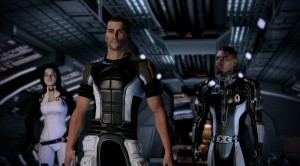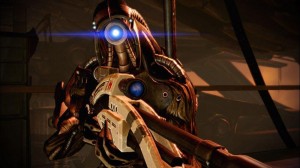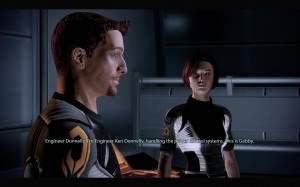Version played: Xbox 360
Also available on: PS3, PC
Producer: BioWare
Publisher: Electronic Arts
Year released: 2010
Time played by reviewer: Single player; 41 hours
I’ve been out in the black for so long that time has become a blur. A year. Six months. 41 hours. 41 hours…
It’s fair to say that Mass Effect 2 is an absorbing, enthralling, sprawling time sink. It’s one of the very few games I’ve had the inclination to see right through to its denouement, such as it is. It’s also fair to say that whatever I put down as a score for this review is kind of irrelevant – two years after its release, you’ll already have decided either that this isn’t your cup of space opera or you’ll have your ME3 preorder in already. With that in mind, here are some of my thoughts and impressions – note that I played this as a male Shepard but you can easily substitute “his” for “her”! (this may contain one or two light spoilers).
The game starts with an almost literal bang. Following on from the events of the first Mass Effect game, the Normandy is out patrolling for Reaper incursions when it’s ripped  apart by a powerful laser blast from a strange vessel. In the process of evacuating his crew, Commander Shepard, with his spacesuit failing, is lost in the void – apparently dead before the action has even taken place. It transpires that his body is recovered by a shadowy human-supremacist organisation called Cerberus, who bring him back to life for their own ends. This plot twist also serves a practical function – it enables the player to recreate aspects of their character, if imported from the original game, or go through the character customisation for the first time if not.
apart by a powerful laser blast from a strange vessel. In the process of evacuating his crew, Commander Shepard, with his spacesuit failing, is lost in the void – apparently dead before the action has even taken place. It transpires that his body is recovered by a shadowy human-supremacist organisation called Cerberus, who bring him back to life for their own ends. This plot twist also serves a practical function – it enables the player to recreate aspects of their character, if imported from the original game, or go through the character customisation for the first time if not.
Once this is done, it’s on to the game proper. Like the first Mass Effect, the story is driven on by the need to recruit members for your team to strike back at the Reapers and their underlings the Collectors – insectoid creatures who have been invading human colonies and kidnapping their inhabitants for as-yet-unknown purposes. Assembling your intergalactic posse is something of a two-stage process – you carry out one mission to recruit a member of your team, and then once on board a loyalty mission for that character will open up for you. It’s worth investing your time on these missions – even if you don’t particularly like a character – as a character’s loyalty (or not) can have a significant impact on Mass Effect 2‘s endgame.
These characters are, largely, some of the more interesting that I’ve come across in games – with the exception of one of your early recruits, Jacob, who to me seemed as bland as a particularly milky and tepid cuppa. The loyalty missions that you perform significantly help to flesh out your crew’s backstories and give the game some real emotional heft – as do the reappearances of some old friends and acquaintances from the first game. This is backed up by BioWare’s customary depth of storytelling, as well as some well designed cutscenes. A great example of this is when you recruit a Geth, Legion, to your team and carry out his loyalty mission. Legion is  beaten up and scarred from previous battles, and wears a patchwork of recovered pieces of armour to cover the fissures in his own. One of these happens to be a piece of Shepard’s N7 armour, recovered from where his body had fallen. Shepard interrogates Legion as to how this came to be in his possession, and more importantly, why Legion chose to wear it. Nothing is laid on particularly thickly, but with a simple glance in a cut screen and about five words of dialogue, it becomes apparent that Legion not only admires Shepard greatly but is also transcending the Geth’s “hive mind” thinking.
beaten up and scarred from previous battles, and wears a patchwork of recovered pieces of armour to cover the fissures in his own. One of these happens to be a piece of Shepard’s N7 armour, recovered from where his body had fallen. Shepard interrogates Legion as to how this came to be in his possession, and more importantly, why Legion chose to wear it. Nothing is laid on particularly thickly, but with a simple glance in a cut screen and about five words of dialogue, it becomes apparent that Legion not only admires Shepard greatly but is also transcending the Geth’s “hive mind” thinking.
In the course of your travels to recruit your motley crew of heroes, hustlers and ne’er-do-wells you’ll travel to some truly spectacular locations, by turns grungy, lush, ruined and hi-tech. A particular favourite of mine is the Bladerunner-esque hollowed-out asteroid Omega, complete with the vaguely sleazy Afterlife nightclub (word to the wise – don’t let Shepard dance. He looks less like an intergalactic saviour, and more like a middle-aged relative at the end of a wedding.) Ilium, too, features some breathtaking vistas – most of which make me wish I’d played the game on a pimped-out desktop machine. It’s to BioWare’s credit that much of this looks so good on the Xbox 360. As far as some of these planets go, it helps that the exploration system in the first game has been jettisoned – gone is are the ungainly, bland treks around identikit planets in the largely despised Mako sections of the original game in favour of a somewhat divisive “planet-scanning” mode (I found it strangely soothing). The only planets that you’ll ever land on in Mass Effect 2 are ones that play some part in driving the story on, which helps to maintain interest.
Once you’ve landed on one of these worlds and selected your squad as per the first game, Mass Effect 2 turns into a full-on cover shooter. The gameplay is far more streamlined than the previous version, with much less stats-bashing and a simpler  weapon upgrade system – you basically just discover new weapons and kit that get researched on the Normandy later rather than applying a number of perks and tweaks to the basic weapons. This has been something of a bone of contention amongst hardcore RPG-ers – I personally enjoyed the slightly simplified inventory system. It does feel that at times there’s an awful lot of ducking behind crates in the game – in fact, I thought it was a bit of a relief when one of the loyalty missions turned out to be a case of simply tailing a character – but unrelenting shooting doesn’t seem to have done the Gears of War franchise any harm, and while not as slick as Epic’s offerings, the shooting mechanics are well done and largely satisfying, with a good selection of powers, bombs and boom-sticks to use.
weapon upgrade system – you basically just discover new weapons and kit that get researched on the Normandy later rather than applying a number of perks and tweaks to the basic weapons. This has been something of a bone of contention amongst hardcore RPG-ers – I personally enjoyed the slightly simplified inventory system. It does feel that at times there’s an awful lot of ducking behind crates in the game – in fact, I thought it was a bit of a relief when one of the loyalty missions turned out to be a case of simply tailing a character – but unrelenting shooting doesn’t seem to have done the Gears of War franchise any harm, and while not as slick as Epic’s offerings, the shooting mechanics are well done and largely satisfying, with a good selection of powers, bombs and boom-sticks to use.
It’s worth mentioning Jack Wall’s soundtrack for Mass Effect 2 which helps to lend some well-judged atmosphere to the action. I have to admit to loving the soundtrack to the original, with it’s burbling 70s sci-fi Vangelis-style synths, and while these are largely replaced in the sequel by soaring, Hollywood orchestral crescendos it does lend a more widescreen, epic feeling to many of the game’s set pieces. The moment at which the new Normandy is revealed is a real hairs-on-the-neck moment (for me, at least!) in a game with no shortage of these.
Finally, I’d like to touch on some aspects of the DLC available for Mass Effect 2. The “Lair of the Shadow Broker” pack is fantastic and gives the player an opportunity to become reacquainted with Liara T’Soni. Shadow Broker really adds something to the story as a whole and should serve as an example to any company putting out extra content for their product. “Kasumi: Stolen Memories” is a fun hour or so of gameplay which put me somewhat in mind of the “Shindig” episode of Firefly, for some reason. The storyline of “Project Overlord” was much more interesting than quite a large chunk of its execution, a poignant, Matrix-ish ending just about redeeming some gameplay that reintroduces planet traversal in the jumping, boosting Hammerhead vehicle. Attempting to cross a lava floe in this piece of junk put me in mind of a shiny techno-Frogger – and seeing this again in the “Firewalker” pack made me give up on that particular DLC. In fairness, I could forgive BioWare this (and pretty much anything) in return for Shadow Broker.
In Conclusion
You might have guessed by now that I loved this game. Any complaints that I have are more to do with a couple of bits of wallet-squeezing DLC, and I don’t think it’s fair to punish the core game for this when it’s just so good – after all, I didn’t have to buy it all. That I did, sight unseen, is a testament to what is probably BioWare’s greatest achievement (for me, at least) – they’ve created a universe that I just wanted to have more of, to have an excuse for spending longer in. There are games that do shooting better, for sure. There are games that do role-playing better – indeed, you could argue that the original Mass Effect was a better “pure” RPG. Mass Effect 2, however, synthesises all of these elements into something greater than the sum of its parts, creating an immersive, compelling game that gets its hooks into you in so many ways. You owe it to yourself to dive in.
10/10

